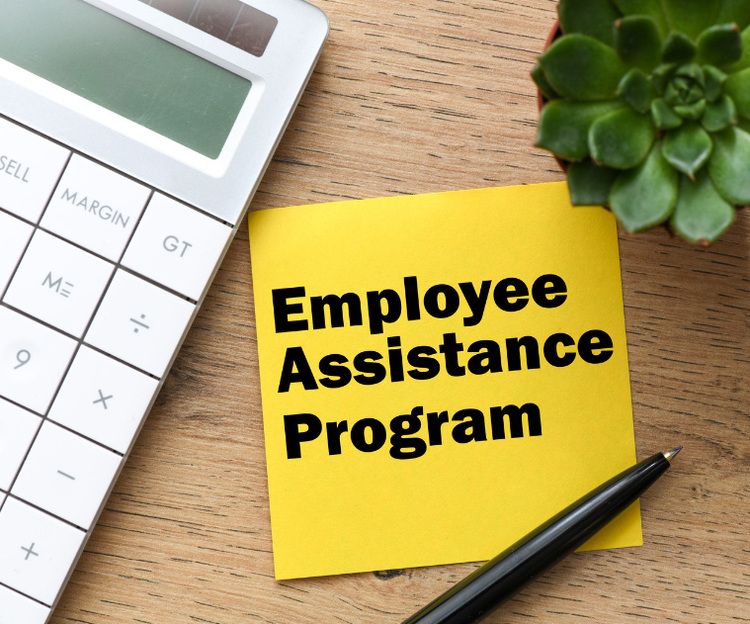
To ensure your employees get help when they need it, one benefit you should strongly consider offering is an employee assistance program. Your employees are the foundation of your company. They can make or break your success, which is why having an employee assistance program (EAP), which helps workers who are struggling with certain personal issues, is good business.
What is an employee assistance program (EAP)?
An EAP, as defined by the Society for Human Resource Management, is “a work-based intervention program designed to assist employees in resolving personal problems that may be adversely affecting the employee’s performance.”
These are some of the common problems an EAP can help employees with:
- Stress management. Work and finances are some of the top causes of stress, according to WebMD. Stress management counseling can provide people with resources and techniques to cope with their stress and minimize the fallout from it.
- Domestic violence. Domestic violence resources range from counseling to legal advice and intervention.
- Grief counseling. Grief can be devastating to anyone. Having to work in the midst of it is often difficult. Grief counseling is one of the most reliable ways to help people through a hard time without completely breaking down.
- Alcoholism. Alcoholism has to be treated carefully and effectively, and EAPs are often better suited for guiding people to proper help instead of rendering it directly.
- Crisis management. Crises happen, and often out of the blue. It can range from losing a house in a natural disaster to any number of other unexpected problems. Crisis management helps people focus on what they can control, and it helps them stay organized. Crisis management resources can help people get back on their feet quickly and with minimal devastation.
- Psychological (mental health) disorders. There are many health disorders that are not disabling. While they introduce challenges to a person’s life, many can be managed. EAP help will typically involve identifying problems and referring people to the right experts to get the specialized help they need.
- Substance abuse. Substance abuse issues are managed much like alcoholism. When a problem is identified, EAP resources can help get the affected person to a qualified professional or into a program that has a good chance of providing long-term help.
- Health and caregiving. Health and caregiving services offer expert advice for people who are in a situation that requires them to provide immediate care to another. The training can prepare a person for giving care to an elderly family member or someone with disabilities.
- Family services. Family services strategize around childcare and family planning. They can offer advice for organizing resources, time and ideas to provide a better home situation. This can include assistance in finding and financing expert childcare, planning family/medical leave, and budgeting for the growing family.
- Counseling referrals. EAPs are limited programs. Ultimately, they best serve the people they assist by providing long-term solutions. For many issues under the purview of an EAP, counseling referrals are the long-term solution with the best prospect for providing meaningful aid.
What are the benefits of an EAP?
One reason behind the popularity of EAPs is that it’s a mutually beneficial program for employers and employees. Healthy and happy employees are more productive and engaged in both their company and individual jobs, which is great for a business’s bottom line.
How an EAP benefits employers:
Employee assistance programs not only benefit your employees, but they can also benefit you as an employer. Learn about some of the top ways an EAP can benefit your business.
- It increases employee productivity. Your employees being mentally and physically healthy is in your best interest as an employer. When employees are healthy, they have more opportunity to be engaged with their work, and engaged employees tend to have higher work performance. In fact, a Gallup study found that highly engaged business units see a 17% increase in productivity.
- It reduces employee absenteeism. That same Gallup study found that highly engaged business units also see a 41% reduction in absenteeism. When employees are healthy, they take fewer sick days. You may also see a higher percentage of employees arriving to work on time, since they won’t be as delayed by physical or mental blocks.
- It boosts employee retention. EAPs support your employees’ health and wellbeing, so they can focus on work. It can result in employees being more engaged and satisfied with their jobs and organizations, which in turn can boost your employee retention rates. Maintaining a high retention rate is crucial to your bottom line. According to Gallup, the cost of replacing an individual employee can range from one-half to two times the employee’s annual salary.
- It improves employee safety. There are roughly seven million reported workplace injuries in the United States each year, resulting in an average of 99 million days of lost productivity. Those injuries are caused by a variety of things, such as repetitive stress (e.g., carpal tunnel syndrome) or accidents (e.g., falls or slips). Although you can’t prevent every accident from happening, an EAP can help ensure your employees are taking care of their physical and mental health, putting them in the best position to be safe and careful at work.
- It saves you time and money. When employee safety goes up, the number of workplace injuries and illnesses go down. EAPs can help reduce the number of disability claims, labor disputes, health insurance claims, and workers’ compensation claims. This can save you a lot of time and money that you would otherwise be spending on these claims.
How an EAP benefits employees:
Some of the benefits of an EAP for employers overlap with employee benefits. These are some additional benefits for employees:
- -The feeling that their employer cares about them
- -Decreased anxiety at work and home
- -More willingness or even excitement to go to work
- -Direct and quick access to experts who can provide the support they are looking for
- -Convenient access to a 24/7 hotline
